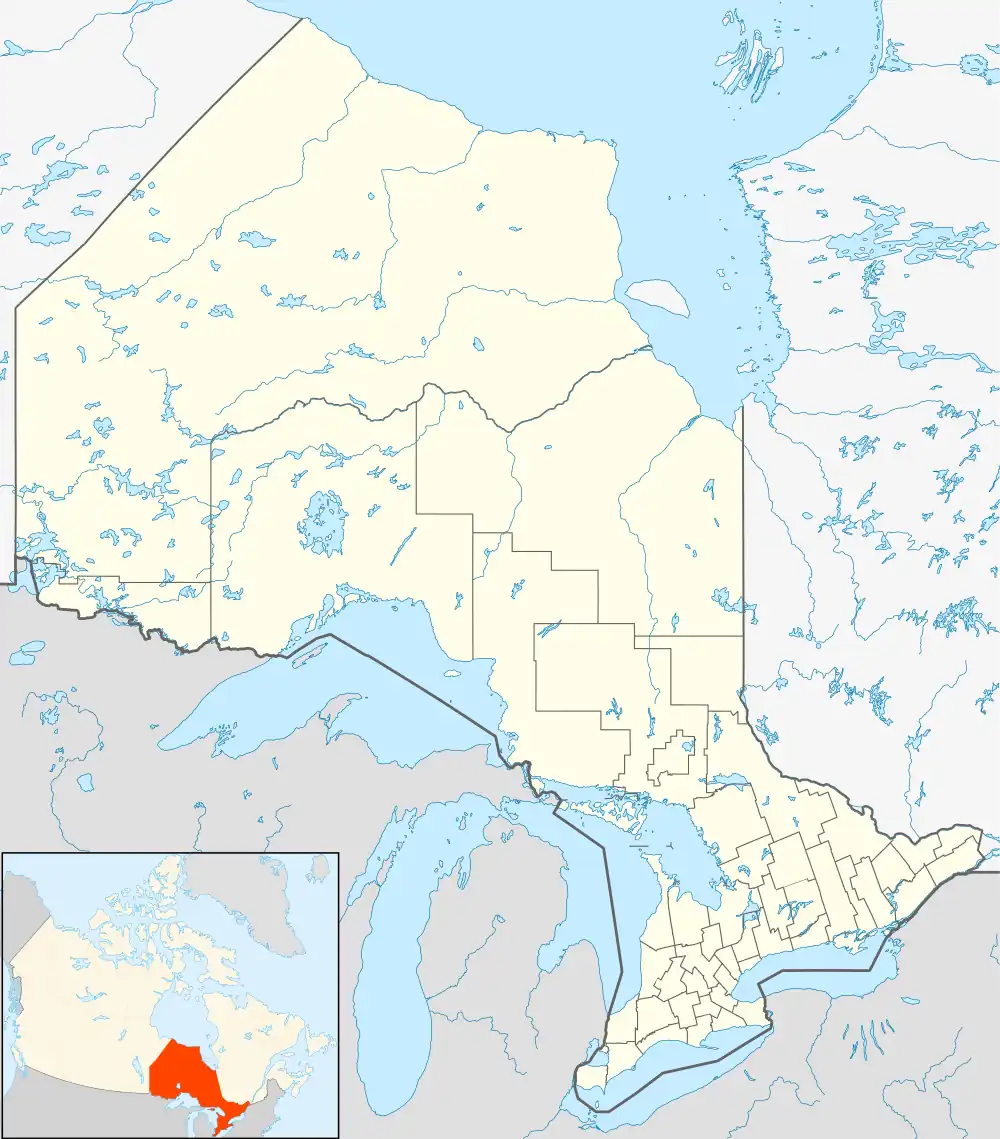Fauquier-Strickland | |
|---|---|
| Township of Fauquier-Strickland Canton de Fauquier-Strickland | |
 | |
| Motto: Ad augusta per angusta (Latin for "Towards success by effort") | |
 Fauquier-Strickland | |
| Coordinates: 49°16′35″N 82°02′14″W / 49.27639°N 82.03722°W[1] | |
| Country | Canada |
| Province | Ontario |
| District | Cochrane |
| Settled | 1909 |
| Incorporated | December 24, 1921 |
| Government | |
| • Type | Township |
| • Reeve | Madeleine Tremblay |
| • Governing Body | Fauquier-Strickland Township Council |
| • Federal riding | Algoma—Manitoulin—Kapuskasing |
| • Prov. riding | Mushkegowuk—James Bay |
| Area | |
| • Land | 1,013.25 km2 (391.22 sq mi) |
| Population (2016)[2] | |
| • Total | 536 |
| • Density | 0.5/km2 (1/sq mi) |
| Time zone | UTC-5 (EST) |
| • Summer (DST) | UTC-4 (EDT) |
| Postal code | P0L 1G0, P0L 2C0 |
| Area code(s) | 705, 249 |
| Website | fauquierstrickland |
Fauquier-Strickland (/ˈfoʊkieɪ/ or /ˈfoʊkɪər/)[3] is a township municipality in Cochrane District in Northeastern Ontario, Canada. The three main communities in the township are Fauquier, Strickland, and Gregoires Mill.[1][4][5][6][7] All are located along Ontario Highway 11 between the community of Departure Lake to the east and the municipality of Moonbeam to the west.
The municipality was incorporated on December 24, 1921, as Shackleton and Machin, the names of the two geographic townships that then comprised its territory. It adopted its current name in 1984, renaming itself for its two largest communities. As of 2018, it includes the two original geographic townships; to the south the eastern half of geographic Macvicar Township, the western half of geographic Carmichael Township, and all of geographic Stringer Township; to the east, the western portion of geographic Haggart Township; and to the north, all of geographic Beardmore Township. Ironically, geographic Fauquier Township is adjacent to the west and is part of the municipality of Moonbeam.[4][5][7]
Fauquier is located along the Groundhog River. The main community landmark is a roadside statue of a groundhog.
Reeves
- Pierre Guèvremont (1922–1929)
- J. Anaclet Habel (1930–1931)
- Ph. Filion (1932)
- Napoléon Gravel (1933–1945)
- J. Émile Jacques (1946–1948)
- Raoul Tremblay (1949–1955)
- J. Antoine Laferrière (1956–1964, 1969–1972)
- Edmond Gauthier (1965)
- Laurent Dufour (1966–1968)
- Raymond Grzela (1972–2003)
- Jacques Demers (2003–2006)
- Madeleine Tremblay (2006–present)
Demographics
In the 2021 Census of Population conducted by Statistics Canada, Fauquier-Strickland had a population of 467 living in 227 of its 278 total private dwellings, a change of -12.9% from its 2016 population of 536. With a land area of 1,010.45 km2 (390.14 sq mi), it had a population density of 0.5/km2 (1.2/sq mi) in 2021.[8]
| 2021 | 2016 | 2011 | |
|---|---|---|---|
| Population | 467 (-12.9% from 2016) | 536 (1.1% from 2011) | 530 (-6.7% from 2006) |
| Land area | 1,010.45 km2 (390.14 sq mi) | 1,013.25 km2 (391.22 sq mi) | 1,013.90 km2 (391.47 sq mi) |
| Population density | 0.5/km2 (1.3/sq mi) | 0.5/km2 (1.3/sq mi) | 0.5/km2 (1.3/sq mi) |
| Median age | 59.6 (M: 60.0, F: 58.8) | 56.2 (M: 56.9, F: 55.4) | 53.4 (M: 53, F: 53.5) |
| Private dwellings | 278 (total) 227 (occupied) | 265 (total) | 367 (total) |
| Median household income | $59,200 | $54,912 |
Population:[14]
- Population in 2016: 536 [15]
- Population in 2011: 530
- Population in 2006: 568
- Population in 2001: 678
- Population in 1996: 684 (or 747 when adjusted to 2001 boundaries)
- Population in 1991: 746
Mother tongue:[15]
- English as first language: 25.23%
- French as first language: 71.96%
- English and French as first language: 0.95%
- English and Other as first language: 0.95
- Other as first language: 0.95%
See also
References
- 1 2 "Fauquier-Strickland". Geographical Names Data Base. Natural Resources Canada. Retrieved 2018-08-21.
- 1 2 "Census Profile, 2016 Census: Fauquier-Strickland".
- ↑ The Canadian Press (2017), The Canadian Press Stylebook (18th ed.), Toronto: The Canadian Press
- 1 2 "Toporama (on-line map and search)". Atlas of Canada. Natural Resources Canada. 12 September 2016. Retrieved 2018-08-21.
- 1 2 "Ontario Geonames GIS (on-line map and search)". Ontario Ministry of Natural Resources and Forestry. 2014. Retrieved 2018-08-21.
- ↑ Map 14 (PDF) (Map). 1 : 1,600,000. Official road map of Ontario. Ministry of Transportation of Ontario. 2016-01-01. Retrieved 2018-08-21.
- 1 2 Restructured municipalities - Ontario map #3 (Map). Restructuring Maps of Ontario. Ontario Ministry of Municipal Affairs and Housing. 2006. Retrieved 2018-08-21.
- ↑ "Population and dwelling counts: Canada, provinces and territories, census divisions and census subdivisions (municipalities), Ontario". Statistics Canada. February 9, 2022. Retrieved April 2, 2022.
- ↑ "2021 Community Profiles". 2021 Canadian Census. Statistics Canada. February 4, 2022. Retrieved 2023-10-19.
- ↑ "2016 Community Profiles". 2016 Canadian Census. Statistics Canada. August 12, 2021. Retrieved 2017-12-22.
- ↑ "2011 Community Profiles". 2011 Canadian Census. Statistics Canada. March 21, 2019. Retrieved 2012-02-21.
- ↑ "2006 Community Profiles". 2006 Canadian Census. Statistics Canada. August 20, 2019.
- ↑ "2001 Community Profiles". 2001 Canadian Census. Statistics Canada. July 18, 2021.
- ↑ Statistics Canada: 1996, 2001, 2006 census
- 1 2 Canada, Government of Canada, Statistics (8 February 2017). "Census Profile, 2016 Census - Fauquier-Strickland, Township [Census subdivision], Ontario and Ontario [Province]". www12.statcan.gc.ca. Retrieved 2017-12-22.
{{cite web}}: CS1 maint: multiple names: authors list (link)
